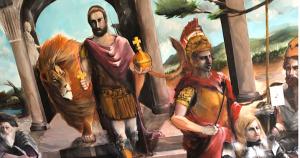 Winter, traditionally, was a time for tales in the northern parts of the world. People mostly farmed and while there is always work on the farm, in the winter there is less and much takes place inside because it must. Light and heat were expensive, at least in terms of labor, and so folk gathered near each other. Then the teller of tales came into his or her own. The story teller could draw on folk tales, shaped over hundreds of years, pieces of epics if memory was good enough, family lore, and imagination.
Winter, traditionally, was a time for tales in the northern parts of the world. People mostly farmed and while there is always work on the farm, in the winter there is less and much takes place inside because it must. Light and heat were expensive, at least in terms of labor, and so folk gathered near each other. Then the teller of tales came into his or her own. The story teller could draw on folk tales, shaped over hundreds of years, pieces of epics if memory was good enough, family lore, and imagination.
Myths were made: not false stories, but stories that told deep truths using fiction. The story was true in what the tale intended to convey- not history, but meaning. Fables, parables, tall tales, saint’s stories were all told. I was born so long ago that I could hear bits of this done at the end of the summer’s day or in the bleak midwinter. I saw the custom fade away under the pressure of television and the death of the tale tellers, and now have lived long enough to regret the loss bitterly.
We need oral tradition and the ability to listen that comes with the winter’s tale. The stories scarcely ever are new, but repeated enough that a next generation of tellers can pass on the tradition. Whatever else we do in the winter holidays stretching from All Hallows’, Thanksgiving, through the fast of Advent, to blessed Christmastide, perhaps we can make a place to renew the old stories. Find someone old enough to recollect a few, rehearse the family lore, and toast the heroes, saints, and legends of the past.
If nobody is left, then there is still hope. The grace of God can give a new generation a winter’s tale to create a new spring for a family, community, or church. We can be born again, renewed, the old can be made new again, even if for a time much has been forgotten that should not have been.
Shakespeare gave us a Winter’s Tale that contains a winter’s tale told by a little boy. That boy will soon slip away from the horrible madness that grips his time. His story is not completed, but his mother, Hermione, carries hope in her heart. She carries forward, what is seemingly dead, the “happily ever after” of the best Christian tales. Against all hope, God’s good grace allows a rebirth of much that has been lost. The story of her little boy is never finished, but he is not forgotten. He is memorialized in the restoration of the family and in the hope of his future resurrection.
The difference between the Queen, who is full of grace, and the King is both the desire to listen to tales and live a mythic life. Too many are content to do “best practices” in whatever situation they face and certainly this is better than doing what will surely not work! The King puts his advisors in impossible situations, but the Queen is not defeated because she refuses to accept the rules he has made. She goes deeper to the mythic and turns her life into a winter tale.
How can we do this practically? When we face a choice between bad and worse, we might look to grace and mercy and see if we can find a way between the bad and worse. Hermione finds (in Shakespeare’s tale) a way to “die” and live. Constantine the Great faced a decaying city of Rome as Roman Emperor and refused to save Rome while saving Rome. He built a new Rome! Walt Disney faced the loss of Oswald the Lucky Rabbit, his first great character, by neither giving up nor engaging in endless recriminations, but by developing Mickey Mouse. He voiced the Mouse, leading by doing. Disney lived a mythic life and so made cartoons that were somehow more, felt like more, than his competition.
May we also learn a winter tale of life in a dark time, grace in a merciless time, and mercy for the graceless.












